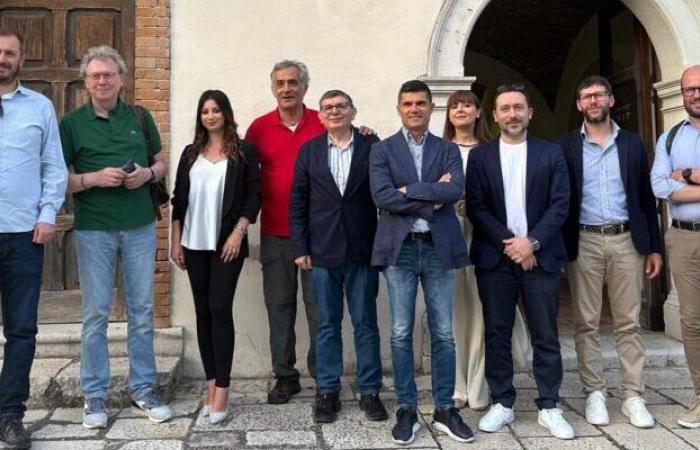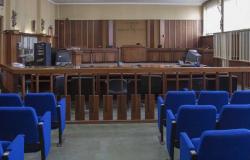
Palazzo De Tommasi – Bozzi in Pietrelcina hosted the fifth meeting on the theme “Spirituality and politics. Manifesto for public happiness: ideas for shared elaboration” organized by “Laboratory for public happiness” in collaboration with Base Benevento,”Topics2000 – Political friendship association”, CSV Irpinia Sannio ETS And Archeoclub Pietrelcina.
The meeting saw discussion, introduced by the coordinator of the Laboratory for Public Happiness Ettore Rossibetween the councilor of the Municipality of Pietrelcina Domenico Rossi; Morena Cecere Deputy Mayor of Montesarchio; Vito Fusco Mayor of Castelpoto; Giovanni Tommaso Manganiello Mayor of San Nazzaro; Simone Paglia Mayor of Campolattaro; Danilo Parente Mayor of Apollosa ed Angelo Pepe Mayor of Apice.
The conclusions were instead entrusted to Don Matteo Prodidirector of the School of Socio-Political Commitment of the Diocese of Cerreto Sannita – Telese – Sant’Agata de’ Goti.
«Pietrelcina once again hosts this wonderful initiative by Ettore Rossi and the Laboratory for public happiness, and the setting represented by Pietrelcina – explained the councilor Domenico Rossi – it is precisely that of a place that was born to unite, to agglomerate around an idea of community, of destiny, the territory, all the municipalities of the territory. We have been blessed to have been the birthplace of the most venerated Saint of the twentieth century and this for us is on the one hand a great honor, and on the other it is something that puts us face to face with a great responsibility which is to be place of discussion, a place open to everyone’s opinions, where everyone can find the key to discussing and being able to promote human and civil rather than political growth of their community».
«We tried to make a first summary of the various meetings we held here in Pietrelcina with the mayors and local administrators on the topic of spirituality and politics. In particular – he underlined Ettore Rossi – we launched the proposal to our mayor friends to collect ideas and proposals in light of their experience in the field, asking them to measure themselves on the topic of public happiness to try to write, with a shared elaboration, a manifesto for happiness. Naturally we will write it over the course of a few meetings and this evening it will be a first part linked precisely to the collection. Because it seems very interesting to us to focus on this theme because on the one hand our communities are gripped by many fears and fears translate into loneliness. But the fundamental purpose of politics is to tell others “you are not alone”, because we have the possibility of building a community of destiny together.
Here, therefore, declaring that others are not only through collective action, political action, is the first step towards building conditions for good living in communities. We have repeatedly insisted on the theme of encouraging civic participation, which means encouraging co-planning, involvement, deliberative democracy, third sector activism to help identify needs and then provide answers to people’s problems.
Well, all these things, certainly, are another element that determines happiness in communities. Just as in these meetings we have repeatedly argued that politics must inspire trust because political institutions work when people relate to them in terms of trust. And, above all, trust is important for the weakest people, those who have fewer resources because in this case politics can perform a promotional function, while those with more resources can also in certain circumstances do without politics.
Therefore the value of relationships, since in a community happiness is based on relationships and therefore politics must build conditions so that generative relationships develop within the community. This is also an important theme which can then be translated into many concrete initiatives that foster relationships by thinking of the elderly, thinking of children, thinking of young people. Communities poor in relationships are unhappy communities, communities richer in relationships are happy communities».
«Writing the Manifesto for public happiness – he said in his conclusions Don Matteo Prodi – it means taking a position on what “public happiness” means. The adjective “public” characterizes this theme of happiness in a very profound way. Because it means first of all being aware that you cannot be happy alone. This is the starting point. Politics is always the construction of a city, of a community, and therefore cannot fail to deal with public happiness. We must refer to the community because community means that everyone brings their gift, “munus”, putting the gifts together, this is politics, putting everyone in a position to make their own contribution so that our city and our community, our place, our territory, is increasingly beautiful and truly more capable of making people flourish. We need prophetic administrators, capable of inhabiting the suffering of the people. Let’s start by saying what each of us thinks and then there will certainly be a way to write this manifesto and the hope is that many will be able to sign it».





